An ongoing subtext in the war with Iraq is whether the situation will turn into "another Vietnam" for the United States -- that is, a war with high U.S. casualties and little obvious progress toward its stated goals.
While it is too early to say whether Iraq will be similar to Vietnam in this regard, we can compare public opinion about Iraq to see how closely it mirrors the trend in public opinion about Vietnam. While Americans initially supported President Lyndon Johnson and generally supported Richard Nixon as they conducted the war, eventually the public came to view the war as a mistake. The public has not reached that stage in its view of the Iraq war, but there are some parallels to the decline in support for Vietnam.
During both conflicts, Gallup asked the public to evaluate how the presidents were handling the war situations, and to assess whether the United States made a "mistake" in sending troops. So far, the data indicate that Americans have generally been more positive about George W. Bush's handling of the war in Iraq than about Johnson's handling of Vietnam, until Bush's Iraq approval ratings recently dipped into the lower 40% range. Public opinion has held steady that it was not a mistake to send troops to Iraq.
War Approval
Lyndon Johnson
After roughly 184,000 troops were deployed to South Vietnam by the end of 1965, Gallup found majority approval for Johnson's handling of the situation in four separate polls. The period from December 1965 to late March 1966 would be the only time that a majority supported Johnson's handling of Vietnam. Gallup initially found 56% of adults nationwide approving in December 1965. In January 1966, 57% approved -- the pinnacle of Johnson's approval on Vietnam. Johnson's approval dipped to 50% in February but rebounded to the mid-50% range in March.
By mid-April 1966, less than half of all Americans, 47%, approved of Johnson's handling of Vietnam. From May to December 1966, Johnson's Vietnam approval showed a slight dip, averaging 42% in that period. In May and June 1966, for the first time, more Americans disapproved than approved.
Approval declined further in 1967, with approval averaging 37% for the year and falling as low as 27% in August -- the low point in Johnson's administration. After that, his approval ratings began to improve, reaching 40% in November 1967. However, the improvement was short-lived and his ratings soon fell in early 1968 to 32% by late February, after the Tet Offensive. By the spring of 1968, after Johnson dropped out of the race for president, his ratings on Vietnam improved to the low 40% range.
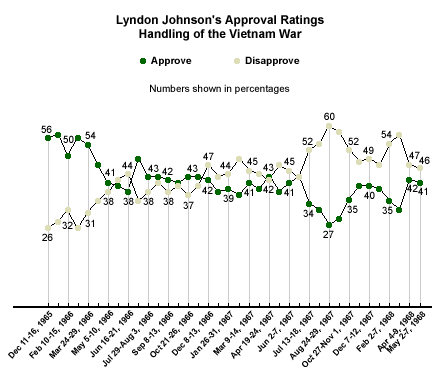
Richard Nixon
Nixon was elected in part because of his "secret plan" to end the war in Vietnam. Early in his administration (March and April 1969), 44% of Americans approved of Nixon's handling of Vietnam. Following Nixon's announcement of a peace offer in mid-May, his approval edged up to 52% from 47% earlier in the month. (It is important to note that during the first four months of Nixon's presidency, between a quarter and a third of Americans had no opinion about how Nixon was dealing with Vietnam.)
Polls conducted from July 1969 through November 1969, when the United States began to withdraw troops, show an average Vietnam approval rating of 54% for Nixon. Nixon's Vietnam ratings averaged 54% again in 1970, then 41% in a single poll in 1971, and finally 52% in 1972.
On Jan. 15, 1973, Nixon suspended military action in Vietnam. A Gallup Poll conducted before this announcement found 43% of Americans approving of Nixon. After this announcement and during the signing of the peace accord in Paris, 75% of Americans approved of Nixon.
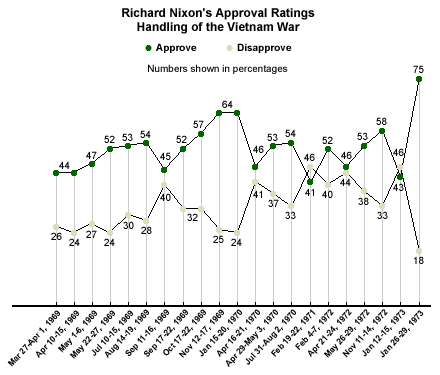
George W. Bush
Bush's Iraq approval was quite steady, with an average of 54%, before the war started in March 2003. Immediately after military action in Iraq began, Bush's approval on Iraq spiked to 71%. It increased to 76% after the fall of Baghdad in mid-April. Roughly a month after Bush announced the end of major combat fighting in Iraq, his approval rating decreased to 63%.
Bush's Iraq approval remained steady in July and August 2003, ranging between 57% and 60%. The ratings began to decline last fall, from 51% in September, to 47% in October, and to 45% in November. In early December, Bush's Iraq rating was 50%. It increased to 61% in an early January 2004 poll, the first Gallup Poll conducted after Saddam Hussein's capture.
Bush's approval ratings on Iraq in 2004 have been marked by a slow, consistent decline. After the 61% rating after Hussein's capture, Bush's Iraq approval dropped to 46% in late January/early February. These ratings increased slightly to 51% in March, before dropping to 48% in April, amid reports describing numerous attacks against U.S. soldiers in Iraq. After reports surfaced in early May about the abuse of Iraqi prisoners, Bush's Iraq approval dropped to 41% -- the low point of his administration. The latest Gallup survey, taken in early June, shows no change in that rating.
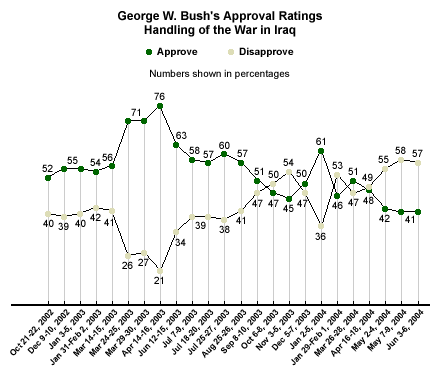
Bush's average approval ratings on Iraq are just slightly higher than Nixon's on Vietnam, but both presidents rate substantially higher than Johnson did. Bush now averages a 55% approval rating on Iraq across 24 polls conducted October 2002 through early June 2004. This compares with Nixon, who averaged 52% across 21 surveys from March 1969 until January 1973, and Johnson, who only averaged 41% over 38 polls from December 1965 to May 1968.
Mistake Sending Troops?
So far, the American public is not convinced that it was a mistake to send troops to Iraq. Since January 2004, between 41% and 44% tell Gallup that it was a mistake to send troops. A majority of Americans across these polls (between 54% and 58%) say it was not a mistake.
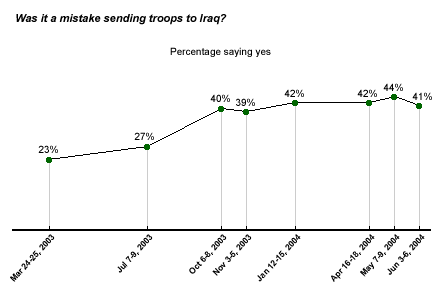
Once the government deployed a large number of troops to Vietnam, Gallup found just 24% of Americans saying it was a mistake to send troops, with 60% saying it was not a mistake. At least half of all Americans continued to say it was not a mistake until July 1967. In July 1967, a plurality still supported the notion that it was not a mistake to send troops to Vietnam, by a 48% to 41% margin.
The tide began to turn by October 1967, when more Americans said it was a mistake to send troops (47%) than said it was not (44%). This pattern persisted for nearly a year, until August 1968, when a majority of Americans (53%) said it was a mistake to send troops. This sentiment grew, as the percentage of Americans who said it was a mistake averaged 55% in 1969 and 1970, then increased to 60% in 1971 and 1973.
Even now in retrospect, Americans feel it was a mistake to send troops to Vietnam. Three polls conducted from 1990-2000 found about 7 in 10 Americans saying it was a mistake.
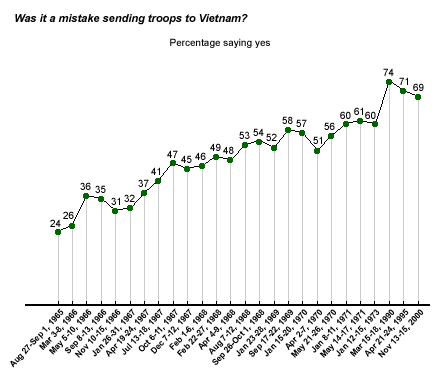
Bottom Line
What do the comparisons between Vietnam and the current war in Iraq mean for Bush? On the plus side, the public, on average, has rated Bush more positively on Iraq than it did Nixon or Johnson on Vietnam, and a majority still do not think the country erred in sending troops to Iraq. However, Bush's Iraq ratings now sit at the lowest level of his administration -- not a good sign in an election year, or as the June 30 transition of power in Iraq approaches. That event looms large and will be key in helping determine whether Iraq will have the same effect on Bush that Vietnam had on Johnson.
